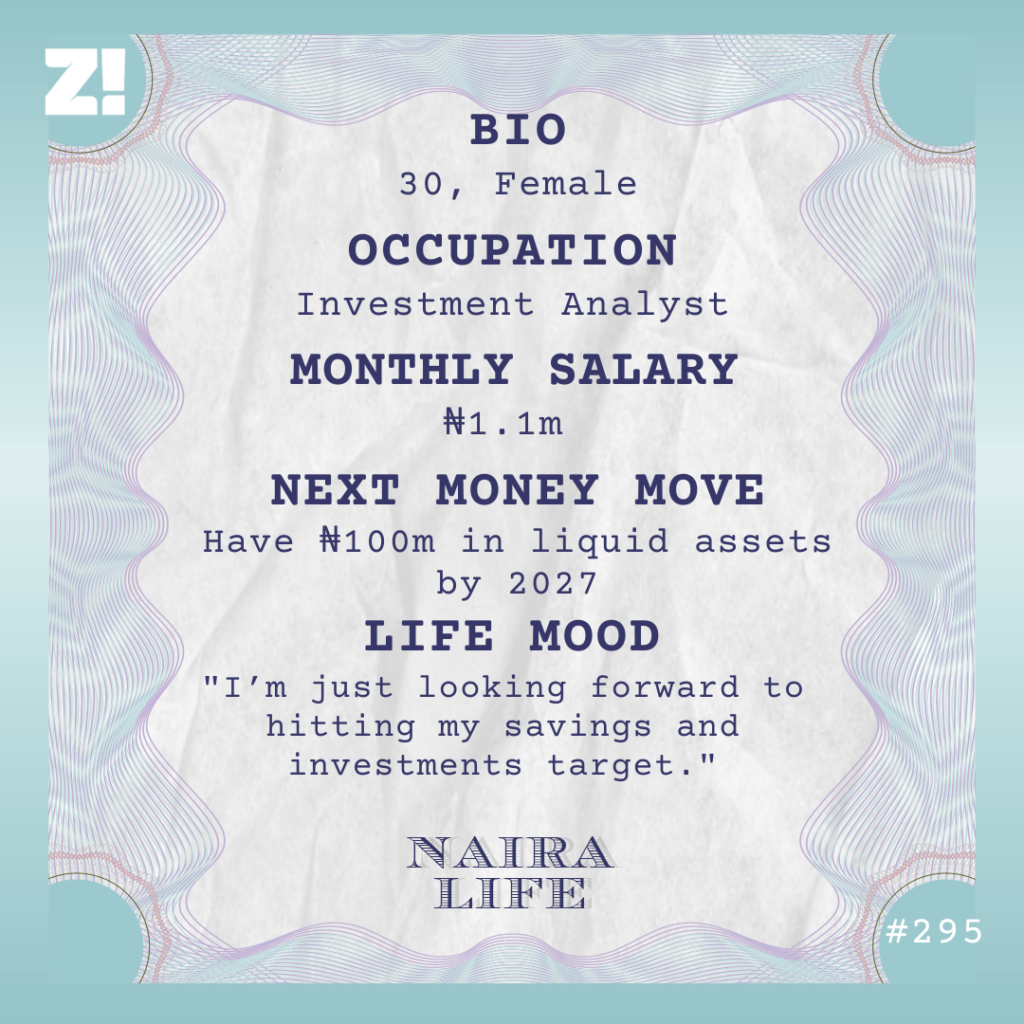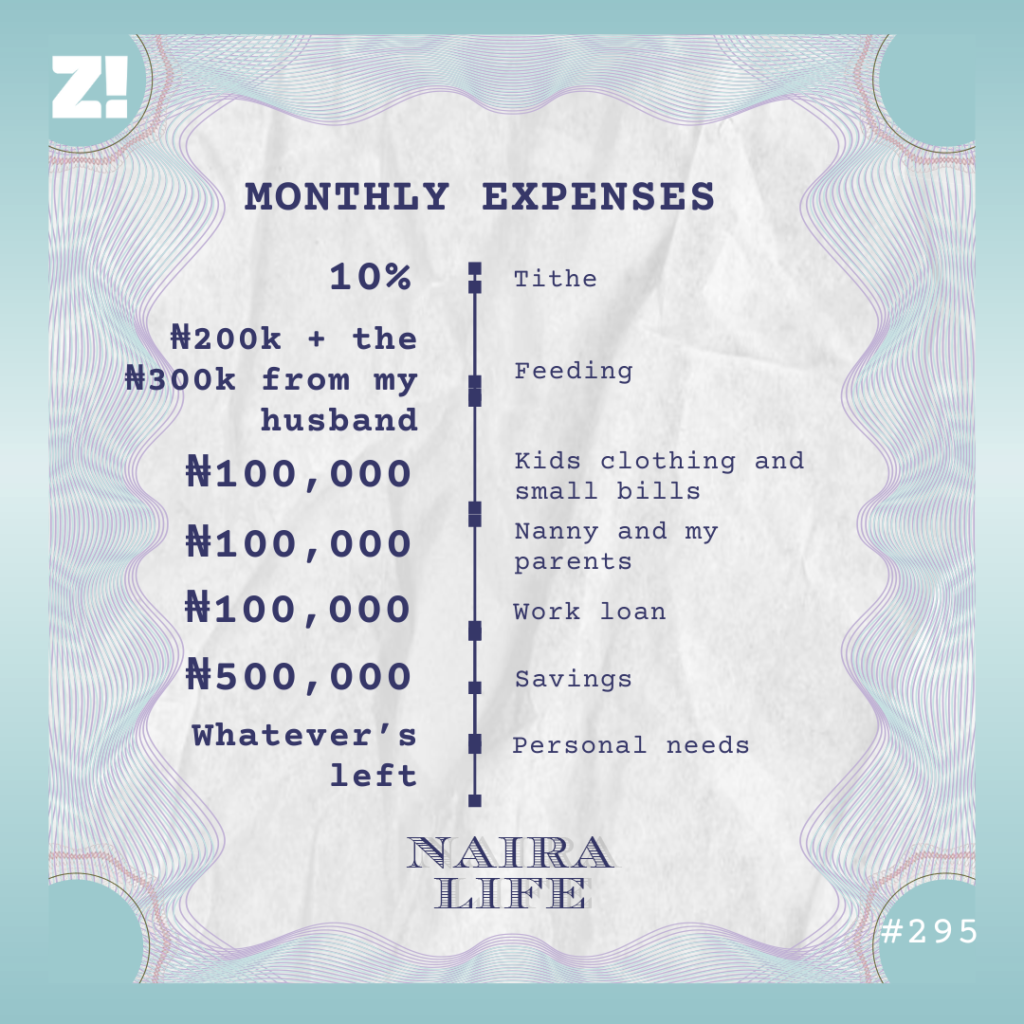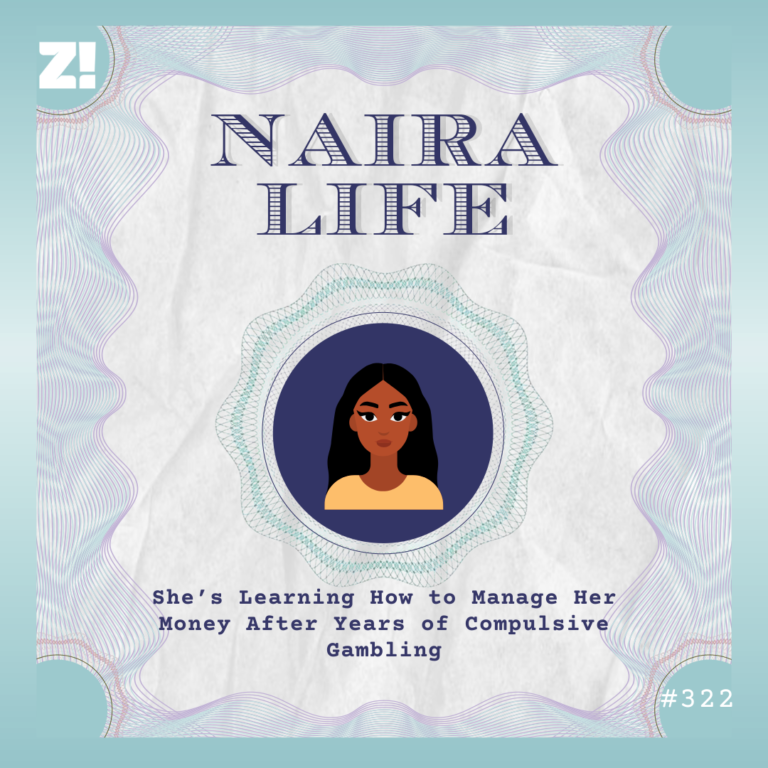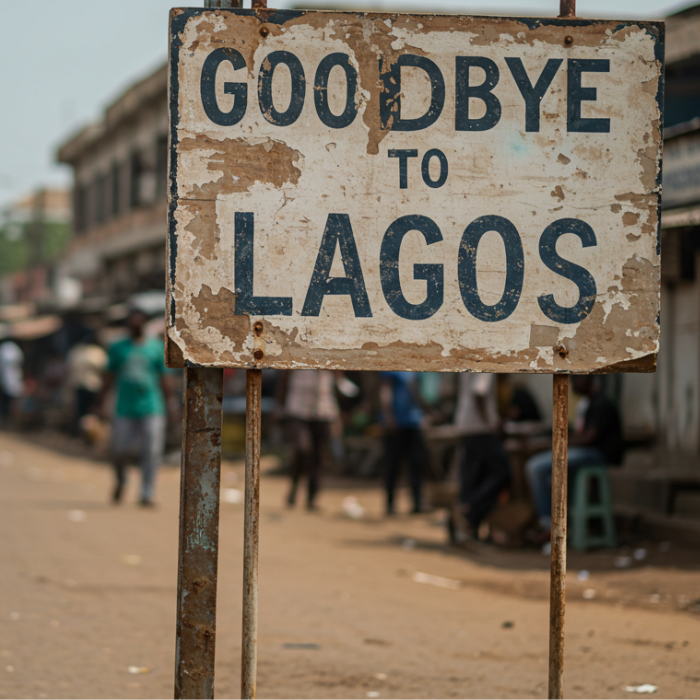Every week, Zikoko seeks to understand how people move the Naira in and out of their lives. Some stories will be struggle-ish, others will be bougie. All the time, it’ll be revealing.

What’s your earliest memory of money?
It’s probably the standard money gifts from visiting relatives when I was a child. Of course, my mum did the whole, “Let me keep it for you,” and I never saw it again.
Ah. The Nigerian child’s rite of passage
I also remember my parents giving me ₦20 for snacks in primary school, which wasn’t bad because it could get me four ₦5 biscuits. But I always noticed that other students had more, and I wanted more too.
For instance, I really liked a drink called “Tandi,” but it cost about ₦25, and I couldn’t afford it on the ₦20 my parents gave me. I could only indulge when I chose not to buy as many snacks to save money. Others didn’t have to do that.
I also noticed that my mates’ parents dropped them off at school in cars while I trekked to school. I don’t know if it was a comparison thing, but it was clear that some people had more. I might have also paid more attention to money because we didn’t always have it at home.
Tell me more about that
It’s not like we were poor. My dad’s a self-employed civil engineer, and my mum worked as a secretary in an international development firm. My siblings and I attended good schools and paid our fees on time.
But money was cyclical. My dad didn’t always have projects, which determined how we lived. When there was money, there was plenty of money — I’m talking cartons of fish and chicken in the freezer. When things weren’t great, we just managed.
Do you remember the first time you worked for money?
Oh yes. That was in junior secondary school. I have fine handwriting and used to write in cursive. My classmates gave me their books to write their names and decorate the pages for them, and they paid in school money.
What’s school money?
I attended a boarding school that didn’t allow students to hold money. So, my parents would deposit money with the bursary for me to withdraw in small amounts throughout the term. But the bursary didn’t give us actual money; it was more like printed vouchers we could use in the tuck shop. That’s what my classmates paid me in.
I don’t even remember how much I made from this because I didn’t charge a fee; my classmates just always dropped something. I also practised hairdressing on them and often got paid random amounts in return.
Both “businesses” meant I hardly ever spent my actual bursary allowance. I almost always collected my allowance back at the end of the school year. Honestly, I didn’t even spend like that in school. I’ve always had a scarcity mindset that pushes me to gather money, spend a little and save the rest.
The next time I worked for money was in uni.
When was this?
2013. I was in 300 level and decided to take advantage of the high density of rich kids in my private university; the girls loved fashion and making their hair. So, my sister and I thought of buying hair attachments and wigs for cheap in Lagos’s Tradefair market and selling them for a profit in school.
My monthly allowance was ₦20k – ₦30k, but I hardly spent money. So, I had enough to buy my first batch of Miss Rose attachment, Yaki straight and Miss Lula hair pieces. I don’t remember all the cost details, but I made a profit of between ₦1k – ₦2k per piece. I did that business for about a month and a half, and I remember making ₦20k in profits in the first month. It was like free money because I didn’t exactly need it. It was just nice to have extra money.
Why did you stop the business so soon?
Word got around, and my hostel mistress learned about the business and warned me. Apparently, I should’ve registered my business first or risk being summoned by the disciplinary committee. I decided it wasn’t worth the stress and just left it. I didn’t try any business again and just lived on my allowance until I left uni in 2015.
NYSC next?
Yup. I moved out of my state for service in 2015, and my parents paid the ₦300k rent for the apartment I lived in for that year. I served at the state ministry and got a ₦10k monthly stipend in addition to the ₦19800 from NYSC.
Service year was my first introduction to how expensive living alone could get. I thought a mattress was only supposed to cost ₦10k. Tell me why I was entering the market and hearing ₦70k – ₦100k for thick mattresses?
Haha
It was wild. My dad supplemented my income with ₦20k/month for the whole year, but I was always in survival mode. I had to pay for everything myself: food, electricity, and transportation, and it was tough.
Food was my biggest concern. That was the time that a bag of rice went from ₦7500 to ₦15k, and food generally seemed so expensive. It took the bulk of my money. I couldn’t even save like I used to.
After I finished NYSC in 2016, I returned home to my parents and started working at my dad’s firm. I studied civil engineering in school, so that was automatically the next step.
Did your dad pay you, though?
Oh, of course. I even had a job title: engineer trainee. But the ₦50k/month salary was too small for me. I’d gotten ₦50k as my monthly allowance while in final year at uni. Why would I graduate and still earn the same thing?
To be fair, my dad’s firm is quite small and runs like a one-man business. Projects didn’t always come in, and I hardly did anything for the almost two years I worked there. The original plan was to finish school and take over my dad’s business someday. But I entered the industry and quickly realised it was full of suffering.
Ahh. Why do you say that?
Civil engineers wait for contracts, and when one does come, the pay is usually 10% of whatever the contract is worth. If the contract takes six months to complete, you’ll use that same 10% to feed your family and survive for the six months. It didn’t make sense to me.
Plus, the firm’s senior engineers only earned like ₦70k. Other engineering firms I knew were also one-man businesses that paid that low. I couldn’t do that long-term.
So, I began actively job-searching. My new plan was to get any graduate trainee program available to kickstart my career. I took multiple assessment tests for multiple organisations until I landed a ₦50k/month management trainee role —just a fancy name for HR— at a management consulting firm in 2018.
Same salary?
I was as shocked as you are. The firm made us attend a compulsory three-month training school before I officially started the role, and they paid ₦30k/month. I expected a salary bump to ₦100k after training, but they used one kind of English to explain why I still had to be on ₦50k/month for another three months before a salary review. When the review eventually came, it was ₦70k.
Transportation took the bulk of my salary. I lived at home and had minimal responsibilities, but after removing transport fare, I could only afford to do my hair. I think I wore only one shoe for the year I worked there. But it wasn’t just the low salary that made me leave.
I’m listening
It was a toxic work culture. My boss was a living nightmare who was quick to berate staff for the smallest mistake. So, I started applications again and got another graduate trainee role at a bank in 2019.
This one paid ₦238k/month after the three-month training school. I was posted to the bank’s head office to work in the risk management department and was excited to acquire actual banking skills. I believed I had a high chance of quickly moving up the career ladder. The money was also a nice touch. It was the first time I was earning real money.
But a few weeks after joining, I realised the growth opportunities at the bank weren’t so great. The person training me had been in one position for three years, and I, who was just joining, was now on the same level as him.
I didn’t want that kind of delay, especially since I felt I was already behind career-wise. It’d been almost five years since I graduated school, and I was still hustling graduate trainee roles. I needed speed.
That’s fair. So, what did you do?
Six months into the job, a friend told me about another graduate trainee opportunity at an investment bank. I remember telling him I was tired of training schools, but he insisted that the bank was good.
So, I applied and passed all the assessments. The offer came in 2020, and at ₦220k/month, it was a slight pay cut from what I earned at the bank. But my friend convinced me I’d have better prospects at an investment bank than a commercial one, so I took it.
I remember being so shocked by the company culture. They didn’t joke with staff welfare, no one was stuck up, and everyone addressed each other by their first names. They even allowed people to air their grievances freely. It took me a while to accept that I was no longer in the toxic workplaces I was used to, and I kept waiting for the other shoe to drop. I still work there, and the shoe still hasn’t dropped.
I guess the time has come with career growth for you
Yes, and several salary increases, too. The bank has a standard 18-month promotion policy. So unless you’re like the biggest fuck-up, you’ll get promoted within 18 months. I’ve gotten three promotions since I joined, and I’m now an associate.
I earn ₦1.1m/month now and get a yearly bonus. The amount is based on the company’s performance, but I have a pretty good idea of how much it’ll be. Last year, it was ₦5m. I’ll probably get around ₦7m this year.
What kind of life does that afford you?
I have a good life. I got married in 2020, and my husband handles the major bills like rent and school fees while I focus on household expenses like food, estate dues and other small costs related to our two children.
I’m still a big saver and constantly looking for opportunities to grow my wealth. I started my career late, and I believe I have to work twice as hard to meet up with my colleagues. So, the bulk of my income goes into different investments.
Walk me through your investment portfolio
Stocks are an important component of my portfolio. I got into stocks when I started working at the investment bank because, well, I work in investment, and my employers talked about stocks, equity, and traditional investments.
So, in 2020, I bought some banking stocks that did well because of the COVID scare. I made a 70% profit from my investment within 7 months, but I held on to my position instead of selling. In my head, stocks were something you held for a really long time. That works for US equities, but the Nigerian Stock Exchange is a different ball game— you just have to trade to make any kind of lasting profit. So, I lost those gains in about 7 months too, after the COVID lockdown scare started to wear off and investors regained confidence.
I began reading a lot about wealth and investment strategies. I read books like “The Wealthy Barber” and listened — I still do — to financial podcasts. I think I was obsessed at one point. I just wanted to make enough to pass a life of luxury to my kids.
The research helped and I’m a lot more focused with my investments now. My portfolio is currently spread out across dollars, commercial papers and equity — mostly equity because I think it’s the biggest multiplier of wealth. You can make three times your investment in a year by trading equity.
This is the part where I cut in and ask how equity trading works
It’s basically like forex trading, except it’s not a scam. Equity is regulated by the SEC and other security exchanges.
This is how it works: Let’s say a company is currently valued at ₦28, but you observe the pace at which the company is growing and generating revenue and speculate that the fair price should actually be ₦40. That means it’s only a matter of time before the company is valued higher. So, you buy the shares at ₦28 and wait for them to be worth ₦40 in the future. That’s how people make money.
When Tinubu came into power, people who knew about equity were waiting on stocks they suspected would be affected by policy changes. When the fuel subsidy was removed, the price of oil and gas companies doubled in value within 10 days. One of these companies is now worth 400% more than it was at the beginning of the year. If you had invested ₦10m then, calculate how much a 400% profit would be.
Mad o
Equity trading is very high risk – high reward. The same way you can make so much easily is the same way loss can happen. But it works if you already have impressive capital. If you’re worth ₦100m and invest only 10%, a loss wouldn’t really affect you like that. But you can make so much more profit.
Personally, I try to take as much informed risk as possible. I took a ₦2m staff loan from work earlier this year to buy a commercial paper that offered 20% interest. Why the loan? There’s a thing called the time value of money. I’m paying an 8% interest on that loan but making 20% from the investment. That’s a 12% spread that’s like free money. My yearly goal is to profit at least 30% on whatever capital I put on the market.
I also set yearly financial goals for how much money I expect to close the year with. This is inclusive of my monthly savings, work bonus, and profit from my equity investments. In 2023, I made ₦20m. I started this year with a ₦35m goal, but I’m on track to close out the year at ₦40m.
I’m curious: Do you have long-term investment goals?
My initial investment goal was to grow my wealth to the point where I could stop working. Due to the nature of my work, I see people make money from actively trading stocks, so I knew it was possible.
So, I set a $1m goal when a dollar was still ₦500, and it seemed realistic. I just needed to preserve my capital savings, make at least 10% profit each year, and use the power of compounding to grow my investment.
Explain to me like I’m five
So, compounding is the amount of interest you earn on your savings that keeps getting added to your initial savings. There are several compounding calculators online. I did an estimate that went something like this: $5k in savings compounded every month at a specific interest rate would get up to $500k in 10-15 years. I reasoned that I’d get to $1m if I saved even more aggressively.
Now I know that’s just lofty thinking sha. The naira has fallen so much; it’d take more than aggressive saving and compounding to make a million dollars. Instead, I’m now working towards getting to ₦100m in liquid assets within three years, meaning I’ll need to make at least ₦20m every year for the next three years. That’s a lofty goal because I’m only sure of ₦13m from my yearly savings and bonuses, but I’ll get there. Maybe I’ll need to take one risky position on the equity market.
With ₦100m, I can focus on making 10% — which is ₦10m — in investment profits yearly, so I’ll no longer need to work as hard as I do. My money will do the work, and I can rest. It may not give me a lavish lifestyle, but I’ll be able to stay afloat and set up my kids to be comfortable. If God forbid, my husband no longer earns enough to support our lifestyle or something happens to him, my investments will come in handy. My husband and I are even considering relocation, so it could also go into that.
You mentioned you mostly handle the household expenses. What does that look like in a typical month?
My husband gives me a ₦300k monthly upkeep allowance, but with how expensive things are now, it hardly does anything, and I have to supplement with my income too. To break it down:

I pay the estate dues (around ₦1m) from my yearly bonus, and I save or invest the balance. I hardly spend on myself because I’m obsessed with meeting my financial targets.
What happens when you hit your ₦100m goal?
I’ll go on a sabbatical or just travel. I’ve actually never travelled anywhere. My husband and I couldn’t go on a honeymoon because we got married during the pandemic, and I had two children in quick succession.
I’d even hoped for 2024 to be my travel year, ₦100m or not. But the economy is shit. I’m now looking at 2025. My husband isn’t so keen on it, but I’ll travel alone if I have to — even if it’s Cotonou or somewhere close. I estimate it won’t cost more than ₦5m.
What’s something you want right now but can’t afford?
Honestly, nothing. I don’t have ostentatious wants. My husband got me a Toyota Corolla as a push gift after I had my baby in 2021, and I’d been fantasising about upgrading the car. But with fuel prices doubling these days, I’ve come to appreciate the car because it’s fuel efficient. I might just paint it because I keep scratching it.
Is there an ideal amount you think you should be earning?
If not for my career delays, I should be earning around ₦1.8m right now. Fortunately, I work in a company that prioritises career progress and income growth, so I should get there by next year.
Inflation is still a concern. I expected to be able to afford so much more with what I currently earn, so I don’t even know if there’s an ideal amount. I’m comfortable, though. I’m just looking forward to hitting my savings and investments target.
How would you rate your financial happiness on a scale of 1-10?
7. I’ve made so much progress with building wealth and my investment portfolio within four years, and I’m grateful for that. But I’d have achieved more if I’d started my career earlier.
If you’re interested in talking about your Naira Life story, this is a good place to start.
Find all the past Naira Life stories here.





